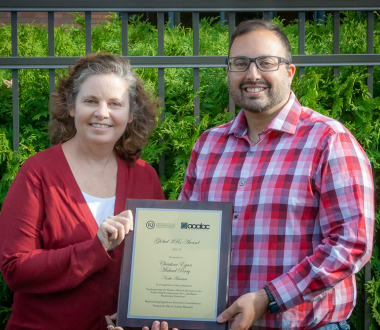
This award recognizes those who effectively advance ethical science through significant, innovative contributions to the 3Rs of animal research - Refinement, Replacement and Reduction.
Up to four such awards are presented annually – one each from North America, Europe, the Pacific Rim, and countries outside these three geographic areas.
Dr. Egan and Michael Perry MS, MS Ed., Director and Associate Director respectively of the Biodefense Laboratory, received the award for their group’s paper titled, "Implementing the Bruker MALDI Biotyper in the Public Health Laboratory for C. botulinum Neurotoxin Detection".
This work compares the gold standard test for botulinum neurotoxin detection, the mouse bioassay, to a mass-spectrometry (MS) and polymerase chain reaction (PCR) based method that does not use animals.
Two Sets of Tests
- Toxin controls - Using dilutions of the four serotypes of botulinum neurotoxin that affect humans, they compared the accuracy and sensitivity of the bioassay to that of the MS technique. They found MS to accurately identify the serotype and to be as, if not more, sensitive than the bioassay for three out of four serotypes.
- Clinical Samples - This was the first time the Bruker MALDI Biotyper was used to identify botulinum neurotoxin in clinical specimens. MS was accurate, correctly identifying all four serotypes without giving false positives for closely related organisms or toxins, and without being negatively affected by such clinical matrices as serum or stool. In these clinical specimens, sensitivity was adequate to detect all four serotypes using MS and PCR.
Advantages
In addition to sensitivity, several other advantages to this CDC-developed method were identified:
- Faster - While the mouse bioassay requires 1-4 days, the MS method takes only 4-6 hours. These results are critical for starting patients on the correct treatment.
- Less specimen volume required - Nine of the 25 clinical specimens submitted to the laboratory for testing were of insufficient volume to perform the mouse bioassay. For these nine specimens, volume was more than enough to perform the MS assay. Insufficient volume is a real concern in the detection of botulinum neurotoxin, especially in cases of infant botulism.
- Fewer ambiguous results - The mouse bioassay can give ambiguous results when other bacteria/substances are present. This was not the case with the MS method.
Background
Clostridium botulinum produces a neurotoxin that causes paralysis. The toxin can be found already preformed in food. Clostridium botulinum also produces spores which germinate, and after which the bacteria may produce toxin. These spores can be found in food, in wounds, or as in the case of bioterrorism, in the air where they are inhaled.
Going forward
Having validated the MS method, the Biodefense Laboratory no longer uses animals for the detection of botulinum neurotoxin in clinical, food and environmental specimens. However, the impact of this work extends beyond the New York State Department of Health. The investigators have already published, presented their findings at several national and international conferences, and trained public health laboratorians across the United States in the animal-free method. It is their hope that the adoption of mass spectrometry technology in other public health laboratories will result in the development of more tests for different compounds, further reducing clinical laboratory reliance on animals.
The Biodefense Laboratory will use the award to further optimize the sensitivity of their method and to maintain the instrumentation which makes this test and further research studies possible.
NYS DOH does not endorse any instrument/manufacturer.
Acknowledgements: We would like to acknowledge Suzanne Kalb and John Barr from the Centers for Disease Control and Prevention who provided Endopep-MS training, reagents / antibodies, technical knowledge and guidance. This work was supported by National Institutes of Health (U19AI109761).
IQ Consortium – International Consortium for Innovation & Quality in Pharmaceutical Development
AAALAC – Association for Assessment and Accreditation of Laboratory Animal Care, International